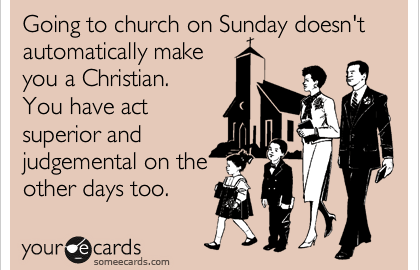One of the main stipulations that was laid on me as a new believer was that I was not to be a ‘Bad Witness’. Emphasis on the capital letters, please – a Bad Witness. Oh, Heaven forbid that any of us should be seen to be a Bad Witness! A Bad Witness was, (somewhat loosely, and never adequately defined or explained), where the believer did something that those outside the Church would see that would somehow cause them to disbelieve that Jesus is alive, that He lives in His Church, in me, and that I walked with Him. So I had to be so, so careful to ‘avoid all semblance of evil’ (1 Thess 5:22)*, especially when in the presence of unbelievers, in case they saw something that was a Bad Witness!
But actually the very worst Bad Witness is seen when Christians try to portray God in any way other than in the Love of Jesus. By being all judgemental, superior and condemning, by hating gays, by looking out for sin in others, they are being a Bad Witness. (The cartoon at the top of this post sums this up rather nicely!) We are not actually called to act in this way towards people; we are, however, called to be Christ to the people we meet. This is one reason why, at least for the sake of the ‘witness’, if you like, it is so important a) to be Christlike and b) to let Him do the transforming to make us like that, not to try to attain it by our own efforts. Trying to do things in any other way except for Jesus’s way is not going to bring Christ to those who need Him. It’s going to be a Bad Witness.
So, how do Christians manage to be such a Bad Witness?
Essentially, we do it by portraying the wrong image of God. Let me quote from a book I am reading just now, called ‘Saints in the Arms of a Happy God’, by Jeff Turner. I have included a few illustrations too which I think emphasise Jeff’s points. Be warned: some of this reads quite negatively, but there is a purpose to this.
“Jesus Christ’s life of others-centered love and forgiveness was meant to do much more than give us a goal to shoot for. It was meant to unveil God. The Grace extended to us is the Sun that rises, giving illumination to His character. This revelation, according to Paul, does not elicit some sort of plastic, pseudo righteousness, nor does it cause us to burn ourselves out with the fever of religious performance. Rather, it brings about true, lasting change in our hearts. It motivates us to real Godly living, simply because in the light of Grace, God looks way too good to run away from, and far too friendly to fight against. When we see Him in the light of Jesus Christ our fear, anxiety, terror, and trepidation all melt into pools, and we find ourselves wondering how we could have ever been afraid of such a beautiful Father.
“Grace causes us to run from the tar pits of legalism and religious slavery, straight into the arms of a Father who, despite what we’ve been told, has never disdained or despised us. We may not have the Pharisees, with their man-made additions to the Mosaic Law among us today, but we have many teachers and preachers who have rushed in to fill the vacuum left by their absence. The same misconceptions of God abound today, though they look a little less Jewish, and a little more Evangelical.
“The sad truth is that we have all inherited a portrait of God that looks far more like Mt. Olympus than Mt. Zion, and it’s an inheritance that most are too terrified to discard. In our Western traditions God is often presented as being cold, austere, distant and judgmental. We imagine Him surrounded by dark clouds, with a scowl sprawled across his angry mug.

“He’s very eager to be pleased, but, unfortunately, extremely difficult to please. He is a hermit that is notoriously difficult to coax out of hiding and even harder to keep around because the slightest scent of sin can send him bolting for the hills in a rage. In fact, one of our imagined deity’s greatest weaknesses is His sin allergy. Wherever there are humans behaving badly, you can be sure he’ll be absent. Where there are broken people doing broken things with their broken lives, God will not be present, for in our mythology human sin works like Kryptonite against him, forcing Him to retreat and separate Himself from us.
“He is mostly sad and mad, and rarely, perhaps when his enemies bite the dust, glad. He is heartbroken over our lack of devotion and disinterest in prayer, but is himself quite disinterested in the everyday events of our lives. He is a demented Santa Claus of sorts, who tightly clenches the naughty list – which we’ve all landed on, by the way – and dreams of filling our spiritual stockings with the burning coals of judgment. When he looks at [a nation], he doesn’t see individual people who desperately need love and mercy, but a widespread, faceless blob of darkness, deserving judgment. He’s sickened by our lack of fervency, repulsed by our spotty church attendance records, and gets all up in arms when our summer vacation extends over a Sunday morning. To put it simply, He’s angry.
mad, and rarely, perhaps when his enemies bite the dust, glad. He is heartbroken over our lack of devotion and disinterest in prayer, but is himself quite disinterested in the everyday events of our lives. He is a demented Santa Claus of sorts, who tightly clenches the naughty list – which we’ve all landed on, by the way – and dreams of filling our spiritual stockings with the burning coals of judgment. When he looks at [a nation], he doesn’t see individual people who desperately need love and mercy, but a widespread, faceless blob of darkness, deserving judgment. He’s sickened by our lack of fervency, repulsed by our spotty church attendance records, and gets all up in arms when our summer vacation extends over a Sunday morning. To put it simply, He’s angry.
“The God that a large percentage of us imagine and pay homage to is disgruntled, disappointed, and disapproving. While some may be fortunate enough to have imagined Him in His true state, my experience has been that 9 out of 10 people, myself included, do not see Him rightly. We’ve been subjected to hours of teachings that have subtly sown into our minds the idea that He is primarily a legal deity concerned with rights and wrongs, and this subconscious programming is absolutely killing us. I would even venture to say that it is the leading cause of anxiety, fear, discontentment, and depression among Christians. In all of this fear, turmoil, and mythology, however, Jesus Christ, the Word made flesh, still stands in our midst, combatting these false ideologies, and seeking to shine the light of Grace upon the face of His Daddy.”
Saints in the Arms of a Happy God: Recovering the Image of God and Man, by Jeff Turner
I know that some of this sounds really negative, but I have included it to illustrate that this is in fact exactly how many people – both inside and outside the Church – see God. Isn’t it terrible? Isn’t it tragic?
So, how and why does that awful picture of God get transferred to being the way that those outside the Church see when they see certain Christians? I believe it is because those kinds of Christians portray, and represent, God in that way because that is how they believe He is, and they try to imitate Him or at least try to be His ‘representatives’, or ‘agents’ in the world. Which is, actually, exactly what the church is called to be – each of us being Jesus to those around us – but of course the actuality is a sick and twisted version of the reality that it should be. Many Christians can’t stand to see others having fun, precisely because they believe that because God is an angry fun-sucker, who is completely concerned with making sure that nobody has fun and is obsessively repulsed by our ‘sin’, then they should represent that to the world, and so of course that’s what the outside world see.

But as Jeff Turner says in my quotation above, Jesus came to show us what God is really like. He went to parties. His first miracle was to make some really strong wine, that, yes, people probably got drunk on. The religious authorities complained at Him for precisely the same reason as today’s fun-sucking religious types did: they saw His disciples having fun! In Mark 2:18-19, we see this story: Some people came and asked Jesus, “How is it that John’s disciples and the disciples of the Pharisees are fasting, but yours are not?” Jesus answered, “How can the guests of the bridegroom fast while he is with them? They cannot, so long as they have him with them”. They thought that being acceptable to God meant being all serious all the time and following strict religious observances, whereas actually we can give God no greater honour than to enjoy, and be thankful for, all the blessings He showers on us each day.
As I have shown in my post Graven Image, Jesus came to show us that the image of God we have picked up by reading the Old Testament, and that the people of His time also believed, was incorrect. The religious authorities of the time had fallen into the same trap as many of the believers of today, the trap of believing that God is angry and must be placated by us making all kinds of sacrifices, including sacrificing the enjoyment of life itself, and the religious authorities of our time too fall into the same trap. It’s all behaviour-based rather than relationship-based. God simply wants a relationship with us! However, when we persist in perceiving God as an angry dictator, we portray Him entirely wrongly.
And so, because we serve an ‘angry god’, we try to act towards others in such a way that be believe he would act – in other words, we try to point out sin, we are bigoted and intolerant, we definitely hate gays (because God says in Deuteronomy that He hates them, doesn’t He?) and we believe that anyone who believes things even slightly differently from the things we believe is destined for eternal punishment.
This, then, is the essence of the Bad Witness!
To come back, then, to the original stipulation of not being this Bad Witness, then, let’s look at what we’ve achieved so far. We don’t do things like partying, drinking, or anything else that others might see as a Bad Witness. What should be our walk of faith is reduced to a set of do’s and don’ts. But, you see, by having such a list of do’s and don’ts, which we then expect as ‘normal behaviour’ for Christians to the world around us, we reinforce in outsiders the belief that ‘Christians don’t do these things’. And so begins, and persists, the vicious cycle of legalism that puts off those people who would so love to have all the benefits of faith in Christ, but don’t want to become like us as the price of obtaining all those benefits. We live under the rules taught by other fallible men, we impose those rules on those in the Church, those outside see those rules and (quite rightly) want no part of it, and we are a Bad Witness. Isn’t it funny? Those ‘outside’ know perfectly well that we are doing things in the wrong way; we just don’t realise it ourselves!

And so people in the world have expectations of what they think Christians should do, look like, behave like, and believe. And even then, that opinion varies from person to person. So it’s actually impossible at best, and destructive at worst, to try not to be a Bad Witness, only except by portraying God as a loving, benevolent Father like Jesus portrayed him.
It must be almost completely apparent by now that it’s time we stopped, as a church, trying to please humans. Because of all the above, you can’t please men. But if instead we please God, by displaying the qualities of Jesus to others, by being Jesus to others, then that will be the opposite of the Bad Witness.
Jesus said ‘by this shall all men know you are my disciples, that you love each other’ (Jn 13:35). Love each other. Love those both outside and inside the Church. Live a life of freedom, not of bondage to man-made rules and regulations.
This is how others will know we are His disciples. Not by our trying to avoid being a Bad Witness!
Jeremy Myers, of the blog Redeeming God, has published an article in which he frames this concept as an apology to the world outside the Church. Click the image below to go to that article:

*Although actually the Scripture says ‘avoiding all kinds of evil’ – somewhat less useful to the legalism brigade!



 mad, and rarely, perhaps when his enemies bite the dust, glad. He is heartbroken over our lack of devotion and disinterest in prayer, but is himself quite disinterested in the everyday events of our lives. He is a demented Santa Claus of sorts, who tightly clenches the naughty list – which we’ve all landed on, by the way – and dreams of filling our spiritual stockings with the burning coals of judgment. When he looks at [a nation], he doesn’t see individual people who desperately need love and mercy, but a widespread, faceless blob of darkness, deserving judgment. He’s sickened by our lack of fervency, repulsed by our spotty church attendance records, and gets all up in arms when our summer vacation extends over a Sunday morning. To put it simply, He’s angry.
mad, and rarely, perhaps when his enemies bite the dust, glad. He is heartbroken over our lack of devotion and disinterest in prayer, but is himself quite disinterested in the everyday events of our lives. He is a demented Santa Claus of sorts, who tightly clenches the naughty list – which we’ve all landed on, by the way – and dreams of filling our spiritual stockings with the burning coals of judgment. When he looks at [a nation], he doesn’t see individual people who desperately need love and mercy, but a widespread, faceless blob of darkness, deserving judgment. He’s sickened by our lack of fervency, repulsed by our spotty church attendance records, and gets all up in arms when our summer vacation extends over a Sunday morning. To put it simply, He’s angry.










